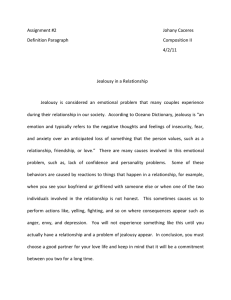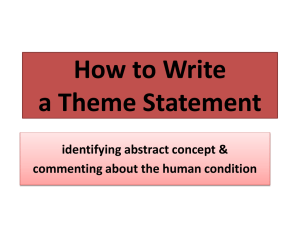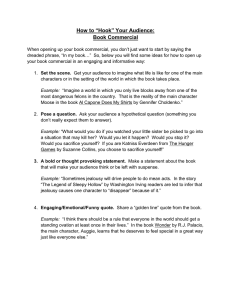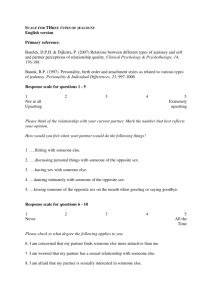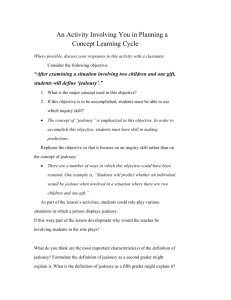57569
advertisement
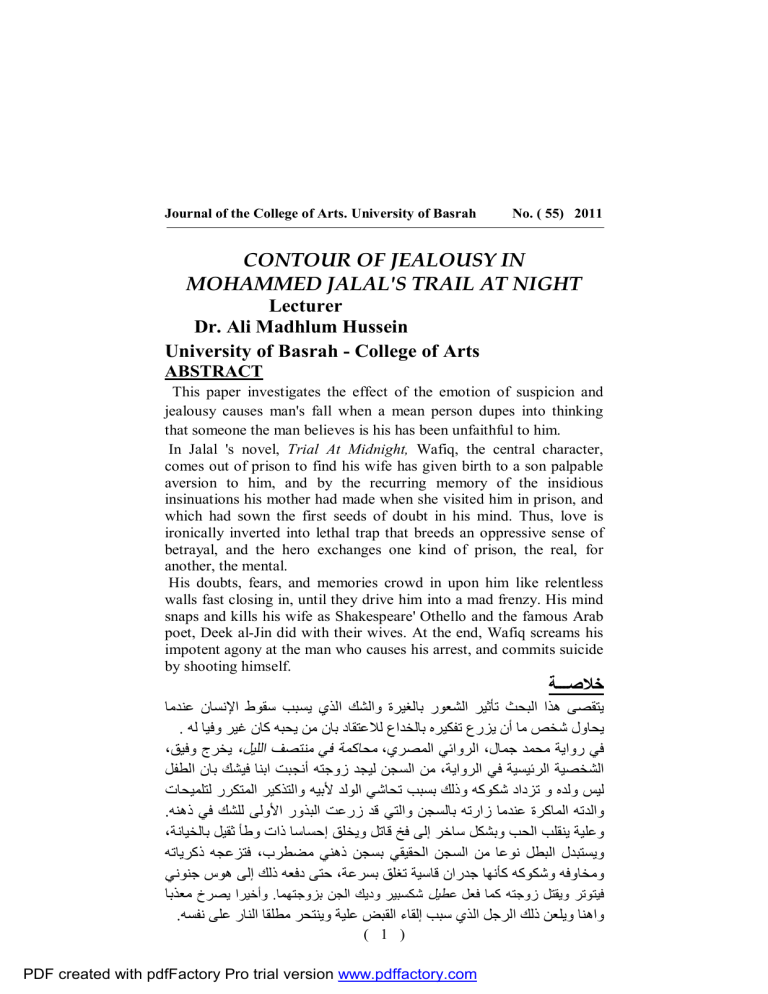
Journal of the College of Arts. University of Basrah No. ( 55) 2011 CONTOUR OF JEALOUSY IN MOHAMMED JALAL'S TRAIL AT NIGHT Lecturer Dr. Ali Madhlum Hussein University of Basrah - College of Arts ABSTRACT This paper investigates the effect of the emotion of suspicion and jealousy causes man's fall when a mean person dupes into thinking that someone the man believes is his has been unfaithful to him. In Jalal 's novel, Trial At Midnight, Wafiq, the central character, comes out of prison to find his wife has given birth to a son palpable aversion to him, and by the recurring memory of the insidious insinuations his mother had made when she visited him in prison, and which had sown the first seeds of doubt in his mind. Thus, love is ironically inverted into lethal trap that breeds an oppressive sense of betrayal, and the hero exchanges one kind of prison, the real, for another, the mental. His doubts, fears, and memories crowd in upon him like relentless walls fast closing in, until they drive him into a mad frenzy. His mind snaps and kills his wife as Shakespeare' Othello and the famous Arab poet, Deek al-Jin did with their wives. At the end, Wafiq screams his impotent agony at the man who causes his arrest, and commits suicide by shooting himself. ﺧﻼﺻـــﺔ ﯾﺘﻘﺼﻰ ھﺬا اﻟﺒﺤﺚ ﺗﺄﺛﯿﺮ اﻟﺸﻌﻮر ﺑﺎﻟﻐﯿﺮة واﻟﺸﻚ اﻟﺬي ﯾﺴﺒﺐ ﺳﻘﻮط اﻹﻧﺴﺎن ﻋﻨﺪﻣﺎ . ﯾﺤﺎول ﺷﺨﺺ ﻣﺎ أن ﯾﺰرع ﺗﻔﻜﯿﺮه ﺑﺎﻟﺨﺪاع ﻟﻼﻋﺘﻘﺎد ﺑﺎن ﻣﻦ ﯾﺤﺒﮫ ﻛﺎن ﻏﯿﺮ وﻓﯿﺎ ﻟﮫ ، ﯾﺨﺮج وﻓﯿﻖ، ﻣﺤﺎﻛﻤﺔ ﻓﻲ ﻣﻨﺘﺼﻒ اﻟﻠﯿﻞ، اﻟﺮواﺋﻲ اﻟﻤﺼﺮي،ﻓﻲ رواﯾﺔ ﻣﺤﻤﺪ ﺟﻤﺎل ﻣﻦ اﻟﺴﺠﻦ ﻟﯿﺠﺪ زوﺟﺘﮫ أﻧﺠﺒﺖ اﺑﻨﺎ ﻓﯿﺸﻚ ﺑﺎن اﻟﻄﻔﻞ،اﻟﺸﺨﺼﯿﺔ اﻟﺮﺋﯿﺴﯿﺔ ﻓﻲ اﻟﺮواﯾﺔ ﻟﯿﺲ وﻟﺪه و ﺗﺰداد ﺷﻜﻮﻛﮫ وذﻟﻚ ﺑﺴﺒﺐ ﺗﺤﺎﺷﻲ اﻟﻮﻟﺪ ﻷﺑﯿﮫ واﻟﺘﺬﻛﯿﺮ اﻟﻤﺘﻜﺮر ﻟﺘﻠﻤﯿﺤﺎت .واﻟﺪﺗﮫ اﻟﻤﺎﻛﺮة ﻋﻨﺪﻣﺎ زارﺗﮫ ﺑﺎﻟﺴﺠﻦ واﻟﺘﻲ ﻗﺪ زرﻋﺖ اﻟﺒﺬور اﻷوﻟﻰ ﻟﻠﺸﻚ ﻓﻲ ذھﻨﮫ ،وﻋﻠﯿﺔ ﯾﻨﻘﻠﺐ اﻟﺤﺐ وﺑﺸﻜﻞ ﺳﺎﺧﺮ إﻟﻰ ﻓﺦ ﻗﺎﺗﻞ وﯾﺨﻠﻖ إﺣﺴﺎﺳﺎ ذات وﻃﺄ ﺛﻘﯿﻞ ﺑﺎﻟﺨﯿﺎﻧﺔ ﻓﺘﺰﻋﺠﮫ ذﻛﺮﯾﺎﺗﮫ،وﯾﺴﺘﺒﺪل اﻟﺒﻄﻞ ﻧﻮﻋﺎ ﻣﻦ اﻟﺴﺠﻦ اﻟﺤﻘﯿﻘﻲ ﺑﺴﺠﻦ ذھﻨﻲ ﻣﻀﻄﺮب ﺣﺘﻰ دﻓﻌﮫ ذﻟﻚ إﻟﻰ ھﻮس ﺟﻨﻮﻧﻲ،وﻣﺨﺎوﻓﮫ وﺷﻜﻮﻛﮫ ﻛﺄﻧﮭﺎ ﺟﺪران ﻗﺎﺳﯿﺔ ﺗﻐﻠﻖ ﺑﺴﺮﻋﺔ وأﺧﯿﺮا ﯾﺼﺮخ ﻣﻌﺬﺑﺎ.ﻓﯿﺘﻮﺗﺮ وﯾﻘﺘﻞ زوﺟﺘﮫ ﻛﻤﺎ ﻓﻌﻞ ﻋﻄﯿﻞ ﺷﻜﺴﺒﯿﺮ ودﯾﻚ اﻟﺠﻦ ﺑﺰوﺟﺘﮭﻤﺎ .واھﻨﺎ وﯾﻠﻌﻦ ذﻟﻚ اﻟﺮﺟﻞ اﻟﺬي ﺳﺒﺐ إﻟﻘﺎء اﻟﻘﺒﺾ ﻋﻠﯿﺔ وﯾﻨﺘﺤﺮ ﻣﻄﻠﻘﺎ اﻟﻨﺎر ﻋﻠﻰ ﻧﻔﺴﮫ ( 1 ) PDF created with pdfFactory Pro trial version www.pdffactory.com Journal of the College of Arts. University of Basrah No. ( 55) 2011 Jealousy is an emotion that everyone shares; it is ultimately responsible for the tragic ending of human relationships. Every one feels jealous at certain times of their lives, and this feeling can cause people to do irrational things. This human emotion also shows people to be weak in the sense that they are never happy with what they have. Jealousy causes people to act incredibly different. People that are almost always are reserved and sincere can become crazy of jealousy. Commenting on jealousy, Baumgard (1990:78) says: "Deeply ingrained in human nature, jealousy occurs in everyone's life, with varying intensity and significance. Profoundly puzzling, jealousy provokes humans to irrational, sometimes violent acts against others or against themselves. "It is a passion that has fascinated writers, storytellers, and audiences through ages"(82). Nothing can ruin a relationship or marriage faster than jealousy. "Jealousy creates anxiety, anger, loneliness, hate, fear. No one thinks clearly when jealous" (Buss, 2001: 962). It is important to distinguish jealousy from envy. "Jealousy is the powerful complex of emotions experienced at the loss, real or imagined, of someone or something you believe is yours, whereas envy concerns what you don't have and would like to possess" (Buss, 2000). To oversimplify, jealousy is angry, envy is wistful. Jealousy is destructive, envy rarely is. Thus, Othello is filled with jealousy at the thought of losing Desdemona; whereas Iago is concerned with envy of Othello's prestige. Once a seed of suspicion or doubt is planted in a person's mind, the noxious effect of jealousy is soon to ensue. Emilia understands that jealousy is a rational affliction but a selfinduced disease of the mind: "Jealous persons, she tells Desdemona, are not ever jealous for the cause, ( 2 ) PDF created with pdfFactory Pro trial version www.pdffactory.com Journal of the College of Arts. University of Basrah No. ( 55) 2011 But jealous for they're jealous." "It is a monster / Begot upon itself, born on itself" (Othello: 161-163). In Shakespeare’s Othello, we know that “Iago dupes into thinking that his wife, Desdemona, has been unfaithful to him. As Othello’s jealousy mounts, we hope that he will discover Iago’s plot before tragedy arrives, but he does not, and kills Desdemona in spite of her protestations of innocence”(Short, 1996:169-170). In the same way the poet known as Deek Al-Jin (a famous Arab poet) killed his wife because of suspicion and jealousy. In Jalal’s(1) Trial At Midnight, the starting point is simple, and somewhat Strindbergian: Wafiq, the central character, comes out of prison to find his wife has given birth to a son; he suspects that the child is not his own. This initial situation triggers off a series of events, mostly psychological, which develop to a climax of dramatic violence. Most of the narrative is rendered through the consciousness of the central character so that we come to identify with his point of view almost completelyalmost, but not quite. For though the other characters exist only in so far as they relate to Wafiq’s mental crisis, they do provide, through their reactions and states of consciousness, other perspectives which seem to contradict and conflict with the central one. Jalal here shows little interest in portraying the external objective world in which his characters live, or their social milieu. He plunges directly into the minds of his characters to -----------------------------------(1) Mohammed Jalal is one of the few contemporary Egyptian men of letters who championed the novel as the art-form most capable of portraying the movement of a fast changing world and the challenges it poses to modern man. ( 3 ) PDF created with pdfFactory Pro trial version www.pdffactory.com Journal of the College of Arts. University of Basrah No. ( 55) 2011 reveal in a series of highly charged “shots”, in which the present merges into the past, their inner thoughts, longings, and agonizing fears and conflicts. As in drama, irony plays a key role in this novel. The initial situation takes on an ironical twist when the hero’s wife Fathia, understandably, displays on his coming home after five years’ absence, a strong sexual passion. Rather than feel gratified by her eagerness, he becomes more suspicious. His doubts are further enhanced by his son’s palpable, but, under the circumstances, quite expected aversion to him, and by the recurring memory of the insidious insinuations his mother had made when she visited him in prison, and which had sown the first seeds of doubt in his mind. In other words, love is ironically inverted into a lethal trap that breeds an oppressive sense of betrayal, and the hero exchanges one kind of prison, the real, for another, the mental. The freedom he gains on his release turns into a worse and more excruciating kind of prison than the one he left. His doubts, fears, and memories crowd in upon him, like relentless walls fast closing in, until they drive him into a mad frenzy. His mind snaps and he kills his wife. The central dramatic paradox on which the novelist builds his novel consists in a contrast between the physical freedom Wafiq attains and his spiritual desolation after his release. Wafiq shakes off the shackles of physical incarceration only to fall prey to a stifling and crushing sense of betrayal, exile, and moral degeneration. Furthermore, Jalal invests this central paradox with a sense of absurdity which accentuates it and gives it more depth. Until the very end, he does not omit to give the reader any clear and logical explanation for the hero’s long imprisonment; nor does he justify, in any clear convincing terms the hero’s present state of mind. It is as if the novel here seeks to suggest an existential ( 4 ) PDF created with pdfFactory Pro trial version www.pdffactory.com Journal of the College of Arts. University of Basrah No. ( 55) 2011 coercion of the Kafkaesque type. Indeed, at many points, Trial at Midnight brings to mind Kafka’s Trial. Wafiq is arrested for no reason at all except that he has embraced a man in front of the university. Similarly, his wife Fathia comes under suspicion and is killed for no greater offence than having given birth at the wrong time. And even his mother-in-law, Nahid, whom the police arrest and accuse of illegal sexual practices, is left until the end with a big question mark hanging over her. The novel ends before the verdict of the court is heard, and significantly, the question of her guilt or innocence remains unresolved until the end. Thus the writer expands the significance of Wafiq’s dilemma. His helpless suffering in the face of the inscrutable arbitrary forces that manipulate him is played in other keys through other characters, until it becomes symbolic of man’s uncertainty and victimization which only death can end. Through the deliberate air of mystery which envelops it, the individual tragedy of Wafiq becomes symbolic of the human condition; it becomes an existential rather than a social experience, and absurdity becomes its keynote and permeating spirit. From the very beginning Wafiq is marked as the tragic victim of unknown forces that work to destroy his mind and propel him on a fatal course. The grip relentlessly tightens. When the siege is complete, and the process of mental disintegration reaches its climax, the hero is left with no choice but violence. Murder becomes his only way out. Futile and senseless as it is, it is the only thing left for him to do, his only means of protesting against the absurdity of an incomprehensible coercive existence – at once a murder, a suicide, and an escape. Wafiq’s meaningless arrest and torture causes a deep crack in his mind. Not only does he feel himself the victim of vicious and senseless oppression, he is also corrupted. He is coerced into making a false confession, as we gather from vague snatches and ( 5 ) PDF created with pdfFactory Pro trial version www.pdffactory.com Journal of the College of Arts. University of Basrah No. ( 55) 2011 quick flashbacks; he also buys a little time off prison term by betraying his friends. His own integrity mutilated, he can see nothing but corruption and betrayal everywhere. Consequently, when he is released he cannot regain his former peace of mind. He comes out obsessed and deformed into a strange world where he can no longer accommodate himself or establish meaningful relationships. The world outside the prison walls becomes coercive, hostile, and menacing as the world inside, and Jalal further suggests that it is not only a question of a sick man’s vision of the world, but that the world is, in truth, sick and frightening. This double meaning comes across vividly in the magnificent scene in Chapter IV where the people of the neighbourhood arrive to welcome Wafiq and end up besieging him on every side. They form a thick impenetrable human wall that threatens to stifle him. As the crowd swells, the anonymity of the faces that gape at him, of the hands that pull and push him, the bodies that press around him acquire a nightmarish quality. The crowd of well-wishers turns into a frightening mob that looks as if it had come to mutilate rather than cheer him. The welcome turns into a physical and mental siege. The state of siege is a central metaphor in the novel; it develops in a rising crescendo until the tension reaches an unbearable pitch and a final explosion becomes inevitable. The seven chapters which make up the novel move swiftly, at a breathless pace, and the well-controlled tempo generates a sense of inescapable doom. It is as if the hero had been enmeshed in a fast thickening web and he struggles and kicks in vain. Apart from the central metaphor of the siege which is set in motion from the moment Wafiq gains his freedom, thus creating a terrible sense of irony, Jalal invests some objects in the novel with certain associations and builds them up into eloquent metaphors which sum up his hero’s conflicting states of mind and his divided consciousness. The dog and the bowl are two ( 6 ) PDF created with pdfFactory Pro trial version www.pdffactory.com Journal of the College of Arts. University of Basrah No. ( 55) 2011 such metaphors. The bowl of salad Wafiq prepares for himself when he comes back home is – as he himself identifies - a symbol of freedom (his freedom to eat what he likes, at the simplest level). It also represents his intense longing to regain his former world and resume his old way of life. Against the bowl of salad as a symbol of freedom, Jalal sets in opposition the black dog Wafiq’s wife acquires after his arrest. Wafiq views the dog as an intruder and an object of terror. He sees him as a devil, a rival, and a force of hatred. The dog casts a dark shadow over his home-coming and becomes the focus of his agonizing sexual suspicions and sense of betrayal. For him the dog also embodies his son’s undisguised aversion: He contemplated the tail of the black dog; it looked to him the tail of the devil. ‘He guarded me when I was all alone,’ she said. But Wafiq felt a strong urge to kick his black bloated belly, and his right foot twitched. Fathia added, stressing her words, ‘He’ll get used to you in time my love.’ Samih sat on the floor and scattered the sweets around him. One fell into the salad bowl. Wafiq picked it up and wiped it on his clothes. He held it close to the boy’s mouth. After some hesitation the boy took it with his hand; but instead of putting it in his mouth, as his father had expected, he threw it away. Wafiq’s nose quivered. Quickly Fathia picked up the sweet and stuffed it in the boy’s mouth (Trial at Midnight, 1974: 19). Some incidents like these, which Jalal renders in quick shots, in an urgent telegraphic style, create for the reader Wafiq’s sense of loss and betrayal. Wafiq tries to regain his lost paradise by dwelling with his wife on the the early memories of their stormy and passionate ( 7 ) PDF created with pdfFactory Pro trial version www.pdffactory.com Journal of the College of Arts. University of Basrah No. ( 55) 2011 courtship. To Wafiq’s disrupted and confused present, Jalal successfully contrasts an idyllic past. The love memories create a poetic mood shot through by a deep sense of irretrievable loss. But the recaptured paradisal spots of time interchange with demonic moments. The harmonious poetic mood is constantly disrupted by the satanic echoes of the voices of coercion – those of the interrogator and the jailer, Sergeant Omar. Every time Wafiq retrieves a meaning or recaptures a healing image, the echoes storm through his mind causing a deep fissure, and the image blurs and fades away. As the voices persistently break in on the present, his efforts to escape into his harmonious preprison world come to grief: A bird sang; a flower swayed; a boy clung to a girl. Sergeant Omar’s voice squashed him. He felt it spouting out of his shoulder where Fathia had touched him (27). As the memories of love cease to suggest harmony and integration and begin to link up with and evoke the memories of the cell, Wafiq becomes hopelessly isolated and cut off from any healing human contact: the only route of escape left him is completely blocked. He misinterprets his wife’s passionate nature as evidence of fickleness and the absence of sexual restraint, and regards her ardent desire for him as a sign of innate depravity. The sexual union she craves becomes for him a symbol of debauchery rather than the union of two lovers. In his mind the bedroom fades out into the cell: ‘Open the door Fathia! Open the door.’ He found the door unlocked. He went out. They had opened the prison gates and let him out into a sunless day (36). Rather than heal him, Fathia’s passion turns into a scorpion that preys on his mind and poisons his thoughts. Ironically, her love ( 8 ) PDF created with pdfFactory Pro trial version www.pdffactory.com Journal of the College of Arts. University of Basrah No. ( 55) 2011 becomes part of the fast tightening siege. Consequently, the wide world he is released into shrinks to the size of a cell. Another object which Jalal invests with metaphoric value is Fathiyya’s unfinished portrait. The portrait which Wafiq starts before his arrest and fails to finish after his release is charged with meaning and becomes a metaphor for loss of freedom, love, and creativity. It is, to use Eliot’s term, the objective correlative of this feeling of total loss. In other words, the portrait is a symbol of a promise that never came true, the promise of liberation through rebellion which Wafiq shies away from the night he is arrested. Fathiyya tries to recreate for him the missed opportunity, the moment of challenge, but fails. Ironically, by refusing to ally himself with the arch-rebel, and free himself from the oppression of the inherited metaphysical shackles, Wafiq inevitably becomes a fallen Adam. Cowardice is a stigma that seems to stick to Wafiq throughout the novel. Fathiyya mentions it playfully, and Nahid says it emphatically. Jalal here, i.e., in his handling of the night of Wafiq’s arrest, seems to equate political and religious oppression, stressing that submissiveness to the one entails coercion by the other. On the other hand, the unfinished portrait represents for Wafiq, on a more immediately available level, Fathiyya’s broken promise, as he thinks, and all his dark suspicions. It embodies his feelings about her. Like he portrait of Dorian Grey in Oscar Wilde’s eyes, it, for him, subconsciously reflects all the sins he consciously attributes to her. This is why he often feels an urge to destroy it. But because he never reaches certainty either way, he fails to do so. “He wanted to tear it up. But his hands would not move” (37). Wafiq’s mental siege reaches its climax in the crowd scene in Chapter Four which, as I mentioned earlier, is built on the paradox of a welcoming reception turning into a mobbing i.e. on a blessing turning into a curse. In its senselessness and absurdity, ( 9 ) PDF created with pdfFactory Pro trial version www.pdffactory.com Journal of the College of Arts. University of Basrah No. ( 55) 2011 the scene parallels Wafiq’s senseless arrest. Like the mysterious, polite and friendly agent of the police, the mobbing crowd starts by being friendly but quickly turns into agents of victimization. What is important, however, is the fact that in both cases Wafiq falls a helpless prey to oppression after running away from a challenge posed by Fathiyya both to his creativity and his manhood. In both cases, Wafiq proves to be a coward and is suitably punished. In both cases too, the grim absurdity of a friendly police agent and a crowd of friends turning into a mob suggests something of the spirit of the old, senseless, merciless Greek gods, or of the tyrannical Jehovah of the Old Testament. In the novel, Dawlat comes to his rescue; she steps in to snatch him from the jaws of the mob. Dawlat plays an important part in the novel. On the one hand, she stands for the idea of faithful love and the untroubled golden past; and on the other hand, she replays Wafiq’s fall through cowardice and betrayal, and through his quest for integration. First unconsciously, then deliberately, she sets about smearing Fathiyya’s honour and deepening wafiq’s suspicions. She sneaks into her house and spiritually usurps her place. Like Wafiq, Dawlat harks back to the past, as to a paradise lost that she cannot regain in the present. The past in which she and Wafiq lived in a state of pre-fall innocence – symbolized by her unashamed nakedness (she posed for him in the nude) is equally irretrievable for her even though she finally succeeds in sleeping with the man she loves. In Wafiq’s tainted present, his after the Fall existence, Dawlat’s nakedness becomes a sexual snare, and deepens his sense of the fall. Like Adam, sex becomes for him a shameful act that he commits in the dark, in a violent frenzy, and soon tries to forget. After he sleeps with Dawlat in the shuttered studio, he quickly leaves the room, and the flat, without so much as saying a word to her, as if fleeing. After that, Dawlat seems to merge into Fathiyya. This is underlined in the scene where she ( 10 ) PDF created with pdfFactory Pro trial version www.pdffactory.com Journal of the College of Arts. University of Basrah No. ( 55) 2011 invades Fathiyya’s room, stands before her mirror, and uses her make-up. It is as if she was putting on Fathiyya’s face, as if she and Fathiyya had become identified with each other in Wafiq’s mind. And so, rather than as a foil for Fathiyya, or as a liberating force, Dawlat, ironically, bolsters up the hostile siege. The metaphor of the siege worked out in the novel in the manner sketched above turns Wafiq into a symbol of modern man’s depleted existence which is dominated by loneliness, aggression, and failure. The long chapter which ends the novel, Chapter Seven, marks the dramatic climax of the book. Here the thematic threads that have been carefully laid out and developed in the preceding chapters meet and interlock. The chapter is presented through the consciousness of the four main characters (Wafiq, Fathiyya, Nahid, and Dawlat). The tempo of this last day is ominously fast and breathless. The day is cleverly divided into stages marked by the hours, which gives an allusion of a ticking clock that brings us with mounting tension nearer the breaking point and the final act of murder. As the hours tick away, the rope tightens round the neck of the hero and his victim. In this chapter, the narrative voice quickens the pace of the narrative and propels his hero on his fateful course by a series of dramatic discoveries. These discoveries at once deepen his sense of the absurdity of life and clarify to the reader, and to the hero as well, certain issues that have been deliberately left vague so far or cryptically hinted at. The first issue is that of Wafiq’s arrest. For the first time in the novel, we meet the mysterious man on whose account Wafiq was jailed because he had embraced this man who was suspected of working against the regime. The real and absurdly shattering discovery, however, is that rather than work against the regime this man is one of the lackeys of, or, at least, close to it. This becomes clear when he declares that he has “good contacts in the right places”, and offers to help Wafiq find out the real cause of his arrest. ( 11 ) PDF created with pdfFactory Pro trial version www.pdffactory.com Journal of the College of Arts. University of Basrah No. ( 55) 2011 Consequently, the absurdity and the mystery of Wafiq’s arrest is deepened rather than unraveled. It would have comforted Wafiq to have learnt that the man who had involuntarily caused his suffering was a true rebel, a patriot and a man with a cause. Instead, he discovered that he had suffered for nothing, that it had all been a senseless mistake that cost him the best years of his wife. Wafiq, in this chapter, also finds out about the charge against his mother-in-law, Nahid, and condemns her in his mind because the people of the neighbourhood object to the way she dresses, and because Dawlat had called her sinful. Naturally, when Fathiyya finally summons up enough courage, at her mother’s instigation, to bring up the subject, it was too late. She finds that he had already made up his mind as to the verdict. The irony of Wafiq’s attitude is quite obvious: like his persecutors, he judges by appearances and hearsay, and condemns a person without substanttial evidence, on the strength of suspicion and a mere picture in a newspaper. Jalal deliberately withholds the truth about Nahid to underline this irony. But Wafiq belated discovery of the scandal makes him identify the mother with the daughter: in his mind Fathiyya becomes Nahid, thanks to her cowardice and long reticence, as well as to Dawlat’s viciously misleading remarks. At this moment, and with terrible irony, Wafiq reaches the moment of decision, the decision to rebel which Fathiyyya had earlier talked about and urged him to make. But the decision here entails murder. The discovery about his arrest and about his mother-in-law deepens his sense of betrayal. He feels that his world is cluttered with sin and unfaithfulness – as if they had become the law that governs existence. The big question that troubles him is Why? If he, despite his disturbed mental state, had found an answer, he would have been saved and would have seen the logic of things. But as it is, he rushes into murder, and does the only sensible ( 12 ) PDF created with pdfFactory Pro trial version www.pdffactory.com Journal of the College of Arts. University of Basrah No. ( 55) 2011 thing he can think of in his madness, which is to destroy himself and his senseless world with one blow. The senselessness of life is built into the fabric of the novel. Whether man rebels or remains submissive, he is bound to fall. There are no answers, no explanations, no justifications, the author seems to say. Had there been, his hero would have found them and achieved integration. The old system of values which had made sense of human existence has completely collapsed and nothing has taken its place except doubt and aggression. Certainty is man’s means of salvation. Wafiq’s tragedy is that he can never know, never be certain of anything. He is a victim of the circumstances in which he was put. Betrayal and coercion crystallize as the two dominant feelings in modern man’s consciousness. They generate a sense of chaos and colossal destruction. Desperately groping for the logic behind the inscrutable events, for some sort of consolation, Wafiq screams his impotent agony at the man who causes his arrest, and is only answered by silence: I can sleep no more! ……… The brush shakes in my hand! ……… The colours merge in my eyes! ……… My head is stuffed with filth! ……… My wife has been unfaithful to me! ……… My son isn’t my son! (95). Life does not yield any answers that hold comfort. Murder becomes Wafiq’s last resort, and the rising crescendo of this chapter reaches the point of explosion with the gun shots. ( 13 ) PDF created with pdfFactory Pro trial version www.pdffactory.com Journal of the College of Arts. University of Basrah No. ( 55) 2011 BIBLIOGRAPHY Baumgard, Hildegard. (1999). Jealousy: Experiences & Solutions. (Translated by R. Jacobson & Evelyn M. Jacobson). Joe –bi –org / jealousy. htm/ 20k Buss, D.M. (2000). Dangerous Passion: Why Jealousy is As Necessary as Love and Sex. New York: Free Press. _________ . (2001). Human Nature & Culture – An Evolutionary Psychological Perspective. Journal of Personality, 69, 955-978. Joe – bi – org / jealousy. htm/ 20k. Jalal, Mohamed. (1974). Trial At Midnight (Muhakamatn Fi Muntasf Al-Layl). Cairo: General Egyptian Book Organization Press. Shakespeare, William. (1969). Othello. Cambridge: CUP . ( 14 ) PDF created with pdfFactory Pro trial version www.pdffactory.com
